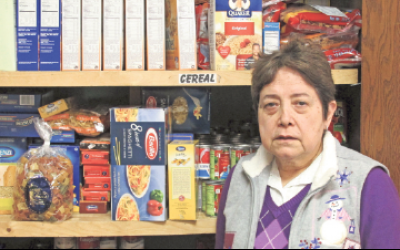
While for many Great Neck residents the holidays are a time of plenty, others find themselves in need of food, clothing and social services – which is where St. Aloysius outreach ministry comes in.
The Great Neck ministry, which along with the Society of St. Vincent de Paul, runs a food pantry, provides clothing and helps Great Neck’s needy families find services ranging from health care to immigration.
The ministry has also been working to raise awareness of poverty on the peninsula – an effort that outreach director Bertha Del Carpio says is paying off.
“Nobody [knew] about poverty in Great Neck,” said Del Carpio. “Once they hear what’s happening, they have a big heart.”
The ministry has made ties with temples, fire departments, churches and schools in Great Neck, which have provided donations and organized holiday meals for the families served by St. Aloysius, Del Carpio said.
Great Neck schools, he said, have run donation drives and temples have provided holiday meals on the Fourth of July, Christmas and Easter.
And the relationship with Great Neck schools is a two-way street. Schools have referred the families of economically disadvantaged students to the ministry where they can receive support with their privacy intact, Del Carpio said.
The contributions have been met with gratitude by families, she said, describing emotional reactions after the Easter celebration.
“The people were so happy,” Del Carpio said. “They were hugging each other.”
Del Carpio described another instance where children from one of Great Neck’s Jewish congregations volunteered to help stock the pantry prior to distribution.
“I was practically in tears,” she said. “It’s creating an awareness that we’re in this together.”
The ministry opens its food pantry every second Saturday, distributing food, clothing and household supplies to about 60 families.
The organization also refers people to charities and groups where they can get needed social services, including medical care.
St. Aloysius, Del Carpio said, opens its doors to all Great Neck families, regardless of faith, ethnicity or immigration status.
“We have Jewish people who come, we have white people who come, we have African Americans who come,” Del Carpio said. “It’s all walks of life.”
Del Carprio said the single biggest demographic served by the ministry is undocumented immigrants.
These families, whose mothers and fathers often work as day laborers, house cleaners and construction workers on the peninsula, make up 60 to 70 percent of the people served by the ministry.
And though St. Aloysius does not offer immigration services, the group refers those needing advice to Catholic Charities of New York, which assists with immigration issues.






